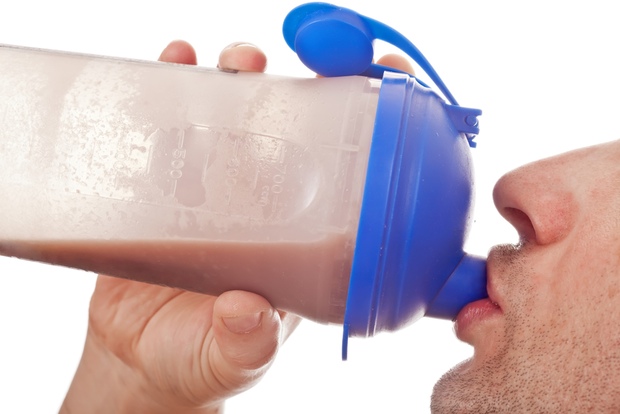We’ve all seen him: the guy in the gym who seems to spend as much time chugging a protein smoothie as he does working out and spends half a paycheck each month on supplements.
Though the protein-guzzling gym rat is an extreme example, Jared Rice, a registered dietitian and an ACSM-certified Health and Fitness Specialist, says the prevalence of high-protein, low-carbohydrate diets (think Atkins in the ’90s and the Paleo diet these days) and a host of misconceptions about protein’s role in athletic performance have created a “society of protein junkies.”
“I think the biggest misconception about protein, especially among people eating an American diet, is that we’re not getting all of it that our bodies need on a daily basis,” Rice says.
Below, Rice and registered dietitian Rebecca Scritchfield debunk several popular myths about protein and athletic performance.
Myth 1: You’re not getting enough protein in your daily diet.
Though protein requirements vary based on age, gender, size, body fat percentage, activity levels, and other factors, most people need roughly 0.8 to 1 gram of protein per kilogram of body weight, says Rice, a triathlete. That’s roughly 80 grams of protein per day for an 180-pound man (81 kilograms x 1 = 81 grams protein). Most Americans eat that much protein easily without modifying their diet, he says.
While athletes do need to consume more protein, says Scritchfield, even they don’t need huge amounts. She says endurance athletes need roughly 1.1 to 1.3 grams of protein per kilogram of bodyweight, and says the most athletes might need to consume is roughly 2 grams of protein per kilogram of bodyweight if they’re looking to build muscle. At the most, a 130-pound woman training to build muscle would need about 118 grams of protein per day (59 kilograms x 2 = 118 grams protein).
Scritchfield, a marathon runner, says, “The way Americans eat, we get a lot of protein just through our meals and snacks, especially if you’re a healthy eater who consumes eggs, milk, Greek yogurt, animal meats, beans, whole grains, nuts, and seeds.”
Myth 2: You need to consume protein powder.
Registered dietitian and author Nancy Clark once famously wrote that you don’t need a whey protein supplement “unless you are a frail, elderly person with a limited food intake.”
“Supplements are purely for convenience,” says Scritchfield. “There’s nothing in a drink made from a supplement that is superior to regular food.”
Myth 3: It’s vital to consume a high amount of protein immediately after a workout.
Protein consumed 30 to 60 minutes after a long or intense workout does promote muscle recovery and synthesis if it’s paired with carbohydrates—“but you don’t need a lot,” Scritchfield says.
Again, recommendations vary depending on a variety of factors, but for most people, “If you have one eight-ounce serving of chocolate milk with 30 grams of carbs and 10 grams of protein, that’s good enough,” Scritchfield says. “If you’re a bulkier guy, you might benefit from 20 grams of protein. I don’t see any benefit in trying to exceed 20 to 25 grams.”
Myth 4: The average gym-goer needs to consume protein after a workout.
Those recommendations are mainly geared toward people who need to maximize recovery before their next workout, such as athletes who are training for a marathon or triathlon.
If your workouts consist of hopping on the elliptical trainer for 30 to 60 minutes every other day, you’ll probably do just fine eating a balanced diet that consists of healthy meals and snacks, Rice says.
“For the average gym-goer, eating a few hours after a workout should be fine,” Rice says.
It’s worth noting that if your fitness goal is weight loss, then eating a post-workout protein supplement could work against you.
“If your workout does warrant a recovery meal, eat a healthy meal, not a supplement,” Rice recommends.
Amy Reinink is a freelance writer whose work has appeared in the Washington Post, Backpacker magazine, Runner’s World, and Women’s Running. She’s also a marathon runner, open-water swimmer, and ski patroller who blogs about her training adventures at amyreinink.com.


















